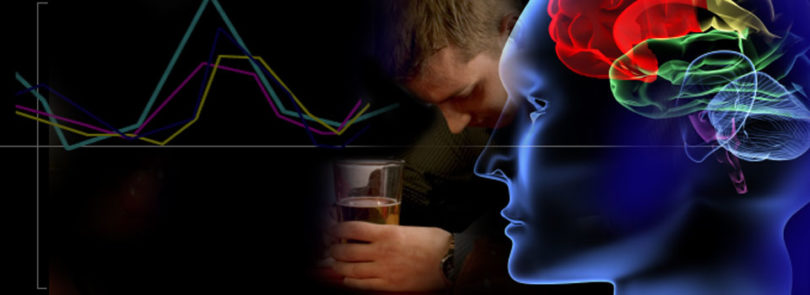Why do people make bad decisions, even when they are aware of the negative consequences of their choices? James MacKillop, Institute for Behavioral Research fellow and assistant professor of psychology, has studied this question as it relates to addiction, specifically alcohol and nicotine dependence.
“Addictive disorders are characterized by persistent bad decision-making,” MacKillop said. “What I enjoy about my work is that by understanding these important public health problems we also understand something basic about being human. Self-control lapses, and the connections between desire, consumption and self-regulation, are a part of the human condition.”
MacKillop’s work combines the theoretical and procedural perspectives of neurobiology, applied clinical research and behavioral economics, which is a hybrid of modern operant theory and microeconomics. He looks at neurological, genetic, motivational, behavioral and pharmacological factors that influence the ways in which people choose to enact their values and spend their resources in situations where alcohol and tobacco are available.
“Addiction is an extremely complex psychological condition,” he said. “I come at the problem from a lot of different angles and use multiple levels of analysis to understand how some people come to over-value alcohol and/or tobacco despite very negative, unhealthy consequences.”
MacKillop hopes to better understand the brain and behavior connections that influence addictive behavior and the effectiveness of psychosocial and pharmacological approaches to its treatment.
He uses functional magnetic resonance imaging data to determine which areas of the brain are activated when individuals make decisions about whether or not to drink or smoke. He also looks at DNA samples in an attempt to answer questions about genetic factors that play into their choices. This approach, applying neuroscience methods to the study of behavioral economics, is characteristic of the growing field of neuroeconomics, in which researchers investigate the neuroanatomical basis of decision-making.
“There is a great deal of excitement about this approach,” MacKillop said. “It offers a new window into pathological decision-making, looking at how preferences and value judgments are encoded in the brain. We are opening the black box and seeing the tug of war in decision-making related to addictive behaviors.”
MacKillop also applies behavioral economics to the study of medications with promise for reducing drinking and smoking behavior. For example, topiramate is an anti-convulsant medication that has been shown to be effective in treating alcoholism. MacKillop and some colleagues at Brown University are investigating whether its effectiveness can be explained by a reduction in the relative value of alcohol. “We don’t understand its efficacy,” he said. “Does it result in devaluation of alcohol through decreased dopamine activation, reigning in the high attributed value of alcohol?”
In another study, MacKillop and his research team at UGA are investigating whether d-cycloserine, a medication useful in treating anxiety disorders, can enhance the process of extinguishing craving-eliciting triggers for drinking.
“Anxious people are very reactive to environmental stimuli that signal threat,” Mackillop explains. “This medication improves exposure treatment by reducing reactivity to those stimuli, and alcohol triggers are to craving as threat cues are to fear and anxiety.”
The study is testing the effectiveness of d-cycloserine as a component of exposure treatment for alcoholism. Will it enhance the reduction of reactivity to environmental triggers after a drinker has been repeatedly exposed to them over time? And will that decreased reactivity ease the craving that motivates alcoholics to drink?
MacKillop is in a good position to study these environmental triggers in his lab at UGA. He and his team have set up a semi-naturalistic environment resembling a smoking lounge and a small bar, where they study the factors that lead people to smoke or not smoke, and drink or not drink. It is well established that environmental cues influence decision making about drug use. In fact, the effects of alcohol are in part contingent on the conditions in which it is consumed.
“Researchers take an objective look at behavior in controlled circumstances, but the typical controlled experimental environment is very sterile,” he explains. “People act unnaturally. In fact, they act like they’re in a psychology experiment. In the bar lab, we are trying to create a link between the lab and the real world in order to evoke a more typical environment and assess behavior in a more naturalistic way. Not many labs across the country have this.”
Currently, MacKillop and his research team are working on two studies, funded by the Alcoholic Beverage Medical Research Foundation and an Independent Scientist grant from Pfizer, examining how subjective desire translates into behavioral economic indices of value. In another study funded by the UGA Research Foundation, they are looking at the neuroanatomical regions responsible for decisions about the value of alcohol. A large survey study designed to inform tobacco tax policy and funded by the Robert Wood Johnson Foundation is examining price sensitivity in smokers. MacKillop’s medication studies are funded by the National Institute on Alcohol Abuse and Alcoholism. MacKillop also is a collaborator with other scientists at UGA, Brown University, and the UCLA on research projects funded by the National Institute on Drug Abuse and the Institute for Research on Gambling Disorders.







